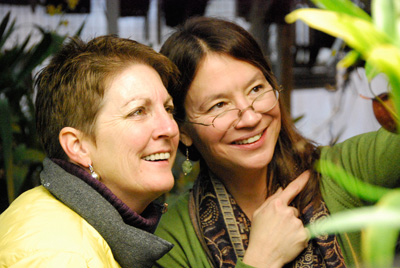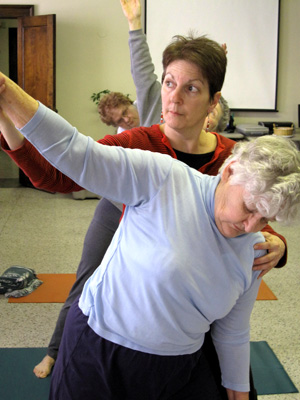Reaching High and Deep

Sarah Lyttle (left) and Eva Zygmunt-Fillwalk find refuge from the Indiana winter viewing the Wheeler Orchid Collection at Ball State University.
Photo by Stephen Smith
Sarah Lyttle has been meaning to leave Muncie since the day she got here.
She came for college, enrolled at Ball State University in 1974. But she ended up dropping out. She married a local man, raised three kids, served on boards, collected friends - she put down roots.
Lyttle's husband ran his own Internet sales business. He was in charge of the household bills. The couple endured financially stressful times, Lyttle says, but nothing prepared her for the disaster ahead.
One day she came home to find a sheriff's note tacked to the door. It said the county was selling her home because of overdue property taxes. Her husband confessed that he hadn't paid the mortgage in months, the car payments were behind, and he hadn't paid property taxes in two years.
Lyttle's middle-class life collapsed around her.
She sold her mahogany dining room set. She worked on her marriage and the family finances. She managed to get her two oldest children off to college. She went back to Ball State to finish her B.A. And the stress took its toll.
"It wasn't my plan to file for divorce the last year I was in school," Lyttle says. "That's just how life unfolded." She and her husband had been married 26 years. But the relationship became toxic, the financial anxiety unbearable. She got nothing in the divorce, and plunged into poverty.
"You are in survival mode, putting out fires, just getting through the day, making sure things you need don't get disconnected or repossessed," Lyttle remembers.
Economic misfortune is all consuming. "It causes fear. And fear is a mind killer. Fear will just shut you down. It'll stop you dead in your tracks," she says.
Lyttle says she lived a zombie life for two years. She taught yoga, but had only a few clients. She was relying on food stamps and other assistance programs.
"Are you broke or are you poor?" she asks. "If your spirit is broken, if your ability to dream is missing, then you truly are in poverty. It's just an oppressiveness that is very hard to describe if you've never felt it."
Lyttle was unprepared for this new kind of hardship. She doesn't remember her parents worrying about money. But there she was, 47 years old, raising her youngest son in an apartment in a rundown neighborhood.
Then a Delaware County social worker made a suggestion that would change everything. She suggested Lyttle sign up with a Muncie nonprofit organization called Teamwork for Quality Living, or TQL.

Sarah Lyttle teaches yoga at the Center for Vital Aging in downtown Muncie.
Photo by Laurie Stern
TQL's goal is to eliminate poverty within a community one family at a time. It focuses on people who are motivated to become self-sufficient. TQL connects them with a circle of mentors, called "allies," people who have stable lives and jobs. Lyttle's allies encouraged her to build on her strengths. She's an experienced yoga instructor. She's passionate about the outdoors, and about healthy lifestyles. Her mentors helped her chart a course toward a full-time career teaching senior citizens how to stay active and strong.
Lyttle is now building up a freelance yoga business. And she takes classes toward her master's degree in gerontology when Ball State can offer her work as a teaching assistant. This semester she's sitting out.
Eva Zygmunt-Fillwalk became one of Lyttle's allies two years ago. "It's about helping her persist through frustration," Zygmunt-Fillwalk says. "It's about brainstorming potential connections."
Zygmunt-Fillwalk is a professor of elementary education at Ball State University. Many of the program's allies have connections to the university or other community institutions. Zygmunt-Fillwalk and the other members of Lyttle's circle encouraged Lyttle to promote herself through public speaking. They reminded her of deadlines and bolstered her self-esteem.
Eva Zygmunt-Fillwalk and Sarah Lyttle bounce ideas off each other and talk about their personal lives. They share interests in nature, the power of words and the importance of spirituality. "It's a magical time when we get together," Zygmunt-Fillwalk says.
Lyttle's allies encouraged her to raise her teaching fees. An emphasis on marketing brought her new clients. Her income tripled - but it's still below the poverty line, and she still can't afford health insurance. There are months when she's late paying bills.
Economists might classify Lyttle as poor, but sociologists call her middle class because of her attitude and education. She doesn't like either label. "I'm just a person in a cash flow crunch right now, and I'm working my way out of it," she says.
Lyttle says she believes things will improve, even in this economy. She calls her allies when she has a problem she can't solve herself. "You know it's just having more tools in your toolbox," Lyttle says. "The more people in your life, the richer it is."
Lyttle's plan is to finish her master's degree and then get a full-time job working with seniors or children with special needs. She'd still like to leave Muncie some day. She wants to move where there are mountains or lakes.
In the meantime, though, Sarah Lyttle sits on TQL's board of directors. Soon she plans to become an ally for someone else.
Back to Hard Times in Middletown.

